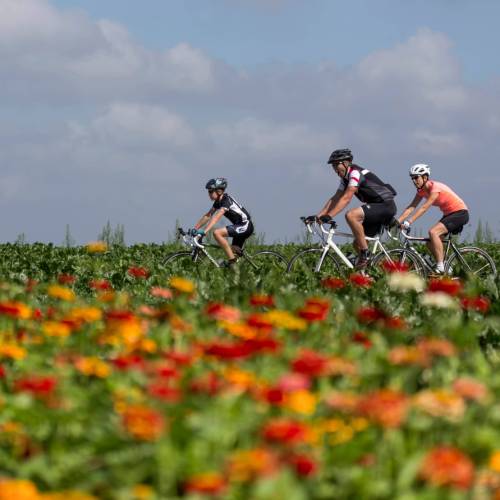Pedaling Toward a Sustainable Future
As global tourism accounts for 8% of carbon emissions, with transport contributing nearly half, the demand for sustainable travel is reshaping the industry. Cycling tour trends for eco-tourism in 2025 highlight cycling’s role as a low-carbon, immersive, and health-focused way to explore destinations. With the global cycle tourism market projected to reach $129.23 billion in 2025 and grow at a 6.8% CAGR through 2030, eco-conscious travelers are driving demand for cycling tours that prioritize environmental responsibility and cultural engagement. From e-bike accessibility to regenerative travel, this article explores the top cycling tour trends for eco-tourism in 2025, offering insights into sustainable routes, inclusive experiences, and innovative technologies that make cycling a cornerstone of eco-tourism.
The Surge of Eco-Tourism and Cycling’s Role
Eco-tourism emphasizes responsible travel that conserves the environment, supports local communities, and promotes cultural immersion. Cycling tour trends for eco-tourism in 2025 align with these principles, offering low-impact travel that reduces carbon footprints (225 kg CO₂ saved annually per rider) compared to car-based tourism. Cycling’s appeal lies in its ability to combine adventure, wellness, and sustainability, contributing to local economies through spending on accommodations, food, and rentals. With 2.3 billion cycling trips annually in the EU, generating €44 billion, cycling tourism is a major contributor to green travel, proving itself as a powerful economic and environmental force.
Why Cycling Tours Are Ideal for Eco-Tourism
Cycling produces zero emissions, making it a preferred mode for eco-conscious travelers. Unlike car or air travel, cycling tours allow travelers to explore at a leisurely pace, fostering deeper connections with landscapes and communities. Cycling tour trends for eco-tourism in 2025 emphasize “slow travel,” with 72% of bicycle trips booked digitally for personalized, low-impact itineraries. These trends support the United Nations Sustainable Development Goals (SDGs), promoting health, reducing emissions, and enhancing inclusive transport systems.

Economic and Environmental Benefits
Cycling tourists spend more time in destinations, boosting local economies by up to 4% of global tourism GDP. They support small businesses, from rural guesthouses to bike rental shops, particularly in lesser-visited areas, combating overtourism. Environmentally, cycling reduces reliance on fossil fuels, aligning with initiatives like the COP29 Declaration on Enhanced Climate Action in Tourism, which promotes low-emission transport. Cycling tour trends for eco-tourism in 2025 leverage these benefits, with governments investing in bike lanes and subsidies to encourage adoption.
Key Cycling Tour Trends for Eco-Tourism in 2025
The cycling tour trends for eco-tourism in 2025 reflect evolving traveler preferences, technological advancements, and infrastructure investments. Here are the defining trends shaping sustainable cycling tourism:
Rise of E-Bike Accessibility
Electric bikes (e-bikes) are revolutionizing cycle tourism by making it accessible to diverse age groups and fitness levels. With U.S. e-bike sales surging 145% in recent years, cycling tour trends for eco-tourism in 2025 prioritize e-bike-friendly tours, enabling longer routes (50–93 miles per charge) and tackling challenging terrains. Providers like Butterfield & Robinson offer e-bike options for multi-day tours, ensuring inclusivity for novice or older riders while maintaining eco-friendly credentials. E-bikes reduce physical barriers, aligning with the 10.6% CAGR growth in the 18–30 age group seeking sustainable adventures.
Multimodal Cycling Adventures
Combining cycling with trains or buses expands destination options while keeping emissions low. Cycling tour trends for eco-tourism in 2025 emphasize multimodality, with operators like EuroVelo enhancing bike carriage on European trains, such as Hungary’s multimodal hubs. Improved booking systems and route information make seamless transitions possible, catering to the 90% of German cyclists who plan trips independently. This trend supports eco-tourism by reducing car dependency and connecting remote regions.
Inclusive and Diverse Experiences
Inclusivity is a priority, with cycling tour trends for eco-tourism in 2025 focusing on accessibility for all ages, genders, and abilities. The ADFC Bicycle Travel Analysis 2024 highlights barriers like physical effort and lack of companions, prompting operators to offer adaptive bikes and group tours. Slovenia’s Green Scheme, certifying 120 cyclist-friendly villages, ensures accessibility through waste management and local engagement. Women-specific tours and family-friendly itineraries, like Backroads’ multigenerational trips, further broaden appeal, fostering cultural immersion and community support.
Regenerative and Slow Travel
Regenerative tourism, which restores landscapes and benefits communities, is gaining traction. Cycling tours in 2025 will support initiatives like rewilding or sustainable farming, as seen with South Africa’s Few & Far Luvhondo lodge, which uses renewable energy and rewilds 50,000 hectares. Slow travel encourages deeper engagement with local cultures, with operators like Cycle Catalan integrating museum visits and food tastings. These efforts align with cycling tour trends for eco-tourism in 2025, prioritizing minimal environmental impact and authentic experiences.
Technology-Driven Personalization
Digital platforms like Komoot, Strava, and Ride with GPS are redefining cycling tour trends for eco-tourism in 2025. These tools offer crowd-sourced navigation, terrain analysis, and carbon impact calculators, enabling tailored itineraries. Blockchain-based loyalty tokens and AR-enhanced heritage trail apps enhance engagement, while 72% of bicycle trips are booked digitally, reflecting a shift toward tech-driven, eco-conscious planning. Operators like SpiceRoads use these platforms to offer sustainable, customized tours across Asia and Europe.
Top Cycling Tour Destinations and Operators for 2025
The cycling tour trends for eco-tourism in 2025 highlight destinations and operators embracing sustainability and innovation. Here are the standout options:
EuroVelo Network (Europe): Best for Long-Distance Routes
The EuroVelo network, spanning 90,000 km across Europe, leads in sustainable cycling tourism. Routes like EuroVelo 10 (Baltic Sea) and the Adriatic Cycle Route connect cultural and natural landmarks, with eco-certified accommodations and e-bike charging stations. The network’s Data Hub tracks economic impacts (€44 billion annually), supporting local communities. Its Bookable Offers search engine simplifies planning for eco-conscious travelers. Explore EuroVelo’s sustainable routes
SpiceRoads Cycling (Asia): Best for Cultural Immersion
SpiceRoads offers eco-friendly tours across Thailand, Vietnam, and Cambodia, emphasizing small group sizes and local expertise. Their itineraries blend cycling with cultural experiences, like heritage site visits, and use sustainable accommodations. With a 10.9% CAGR in Asia-Pacific’s cycle tourism market, SpiceRoads caters to adventure seekers prioritizing eco-tourism. Discover SpiceRoads’ eco-conscious tours
Backroads (North America): Best for Family-Friendly Tours
Backroads provides sustainable, family-oriented cycling tours across the U.S. and Canada, leveraging scenic routes like national park trails. Their focus on eco-friendly accommodations and e-bike options ensures accessibility, aligning with North America’s 27.53% market share in cycle tourism. Backroads’ tours support local economies and promote low-carbon travel.
Cycle Catalan (Europe): Best for Regenerative Travel
Cycle Catalan integrates regenerative principles, offering e-bike tours with local food tastings and museum tie-ins in Catalonia. Their waste-free operations and partnerships with conservation NGOs align with cycling tour trends for eco-tourism in 2025, ensuring minimal environmental impact and cultural engagement.
Arbutus Routes (Global): Best for Eco-Certified Adventures
Arbutus Routes focuses on sustainable cycling across North America and Europe, using eco-certified lodgings and low-impact routes. Their tours emphasize minimal environmental footprints, catering to the 31–50 age group (48.1% market share) seeking health and eco-conscious travel.
How to Choose an Eco-Friendly Cycling Tour
Selecting the best cycling tour trends for eco-tourism in 2025 requires aligning with your values and travel goals. Here’s how to choose:
Prioritize Sustainable Operators
Choose operators like Intrepid Travel or SpiceRoads with carbon-neutral policies and eco-certified accommodations (e.g., B Corp, Green Key). Verify sustainability commitments on their websites or through certifications to ensure low-impact travel.
Consider Route and Infrastructure
Opt for destinations with dedicated bike lanes, like the Netherlands or Germany, or scenic routes like the Loire Valley. EuroVelo’s network offers safe, well-marked paths, while multimodal options ensure sustainable access. Check for e-bike availability to match your fitness level.
Focus on Local Impact
Select tours that support local communities, such as those offering homestays or partnerships with small businesses. Slovenia’s Green Scheme and Tamil Nadu’s heritage tours with Cycling Yogis prioritize local engagement, enhancing economic benefits.
Leverage Technology
Use platforms like Komoot for route planning and carbon tracking. Digital booking systems, used for 72% of trips, offer transparency on eco-friendly options, ensuring alignment with sustainability goals.
Challenges and Solutions for Eco-Friendly Cycling Tours
While cycling tour trends for eco-tourism in 2025 promise growth, challenges remain. Here’s how they’re addressed:
Infrastructure Limitations
Poorly maintained bike paths or lack of lanes deter cyclists. Governments are investing in infrastructure, like Germany’s bike-friendly cities, with Berlin and Munich offering rental shops and safe routes. Operators like EuroVelo advocate for expanded trails.
Safety Concerns
Accidents and injuries are risks, especially in urban areas. Tours with trained guides, like DuVine Cycling, and safety-focused routes reduce hazards. E-bikes with speed limits (20–28 mph) enhance safety for novice riders.
Accessibility Barriers
Physical effort and equipment costs limit participation. E-bikes and adaptive cycles, offered by Cycle Catalan, address fitness barriers, while subsidies in Thailand ($700 million for tourism) lower costs.
Lack of Awareness
Some travelers are unaware of cycling’s eco-benefits. Operators use social media, influencer marketing, and vlogging to promote tours, with 84% of travelers valuing sustainability but needing clarity, per Booking.com.
The Future of Cycling Tours in Eco-Tourism
Cycling tour trends for eco-tourism in 2025 will evolve with technology and policy support. AI-driven booking platforms will personalize low-carbon itineraries, while blockchain loyalty tokens reward sustainable choices. Governments will expand incentives, like Slovenia’s Green Scheme, and infrastructure, such as Italy’s Ciclovia Meridiana. Emerging markets like Latin America and Africa will grow as eco-tourism gains traction, supported by operators like Arbutus Routes. As travelers prioritize wellness and sustainability, cycling tours will remain a cornerstone of eco-tourism, fostering healthier, greener, and more connected travel experiences.
Conclusion
Cycling tour trends for eco-tourism in 2025 reflect a global shift toward sustainable, immersive, and inclusive travel. From e-bike accessibility to regenerative itineraries, these trends empower travelers to explore with minimal environmental impact while supporting local economies. Operators like EuroVelo, SpiceRoads, Backroads, Cycle Catalan, and Arbutus Routes lead the way, offering eco-certified tours that blend adventure, wellness, and cultural immersion. By choosing sustainable routes, leveraging technology, and prioritizing local impact, travelers can embrace cycling tours as a transformative way to experience the world in 2025, pedaling toward a greener, more connected future.



